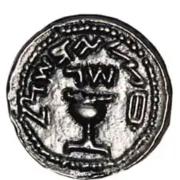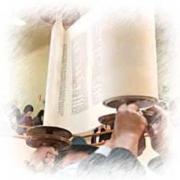Aish Tamid - The Continuous Fire
There were two items in the Bet Hamikdash called a Mizbeach or an Altar, Mizbeach HaChitzon or the Outer Altar or the Outer Mizbeach, and Mizbeach HaPnimi, the Inner Altar or Golden Altar. The root of the word Mizbeach is related to the noun Zevach(sacrifice) and verb Zoveach(sacrificial slaughtering). In this article, I would like to discuss The Outer Mizbeach and the fires on it.
While reading the Parashat Tzav, the Torah tells us that there were three fires on the Outer Mizbeach. Two fires were lit each day and were called ma'arachot or arrangements. The first fire, Ma'aracha Gedolah - The Great Arrangement, was used to burn the flesh of the animals, the parts of the Tamid, and other sacrifices. The second fire was called Ma'aracha Shniya—the Second Arrangement. From here, the fire coals were placed on the Golden Altar to burn the incense, or Ketoret. The Third Fire is called אֵשׁ תָּמִיד - Aish Tamid - The Continuous Fire, a fire that Cohanim were responsible for, to make sure it is lit all the time, day and night, and is never extinguished.
So, as always, anything in the Torah has a deeper meaning. So, what or who do these fires "represent," or how do we understand them?
Let's take the first fire—the Great Arrangement, where they would burn the animals' flesh as a sacrifice. One may think, why would they burn the animal? What did it do to deserve this? Let's imagine a scenario. Person A needs funds, so he approaches Person B and borrows $10,000. Per their verbal agreement, the funds must be returned in 6 months. Person A is happy that he got the money and uses it for their intended purpose. But as sometimes happens, 6 months later, he doesn't have the money to return, or he doesn't want to. When approached by Person B and reminded of the loan, Person A says he doesn't remember borrowing such a sum from Person B. Infuriated, Person B takes him to the Jewish Court (Bet Din), where Person A denies it again and even backs it up by swearing falsely. There's nothing Person B can do now but walk away. And Person A walks away thinking he is off the hook and gets to keep the money. But something happens to him at that moment - a tiny feeling of guilt embeds itself in his heart. As Rosh Hashanah approaches, he feels guilt grow into a raging fire he no longer wants to suppress, so he decides to return the money. He apologized to Person B and gave back the $10,000. The Torah requires him to pay another fifth, amounting to $2,500, and, on top of that, to bring a korban, called the Korban Asham, or Guilt Offering. The person admits the wrongdoing, and the animal is brought as a sacrifice instead of him, and the guilt fire that used to burn him inside will now burn the animal and atone for his sin.
The second fire - The Second Arrangement, from which the coals are used for the Ketoret (Incense) offering. The Sages tell us that the aroma of the incense offering is the most pleasurable to Hashem, which is something that Hashem enjoys. A few scenarios come to mind, but I will stop at two - Rabbi Akiva and Rabbi Shimon bar Yochai. The learning of Rabbi Akiva was of such a high level, as was his dedication to the Torah, the number of students he taught, and the knowledge he had, which enabled him to uncover new insights from the crowns of the letters in the Torah. The same goes for Rabbi Shimon bar Yochai—the knowledge of the secrets of the mystical Torah, the Book of Zohar; his dedication to learning; the depth of his learning; and countless new insights he brought forth. This is how the Sages of the past have given ketoret-like pleasure to Hashem daily.
The third fire, The Aish Tamid - The Continuous Fire, is the fire that is never extinguished; this fire can be compared to none other than King David. He was a king, a warrior, and a Talmid Chacham of the highest caliber. He was never satisfied with his accomplishments and was always striving for more. During the day, he governed the country, fought wars, and answered the nation's halachic questions. At night, when the city was sleeping, he played the harp, composed Tehillim, and learned Torah. But he didn't stop there. His desire to grow in the service of Hashem was so great that he even began building the Bet Hamikdash, but Hashem had to stop him, explaining that this task was reserved for his son, King Solomon.
That is why, in Parashat Tzav 6:2 & 6:5, the Torah tells us that "the fire of the altar shall be ignited by it"—by the third, continuous fire. Because The Asham guy - the person that brings the Guilt Offering hoped that he could get away with stealing money, so the Torah tells us to ignite his sacrifice with continuous fire, which in turn will influence him and bring him to the levels of faith where he would never need to bring this type of sacrifice in the future ever again, and going forward, he would grow in Torah observance, and overall grow across the board, and reach his highest potential.
The same is true for the Ketoret guy —the person who learns a few hours a day, but when he finishes, he goes back to his daily routine, and his thoughts of serving Hashem end the moment he puts the book back on the shelf. Torah tells us to ignite the coals for the Ketoret offering with the Continuous Fire, so it gives him a boost in his learning and his service. So his service does not stop once the book is placed back on the shelf or when he walks out from the Bet Midrash, but Hashem and Torah are constantly on his mind, in his daily routine, in every one of his business transactions, and in all of his people-to-people interactions. His learning should not be repetitive, once a day, and just going over some text, but deep and earth-shattering, making the time for it during the day and night, to the point where the new insights are pouring out of him just like it was with Rabbi Akiva, Rabbi Shimon bar Yochai, and plenty of other Jewish Sages. And this is how we can give pleasure to Hashem—our own Ketoret offering, a pleasant aroma of the Torah.
So, are you an Asham or Ketoret guy? The Aish Tamid level is just a few steps away. Isn't it time to step up your game?!!
To all the Aish Tamid Tzaddikim - we are coming and we will see you at the top!!
Shmuel Katanov














